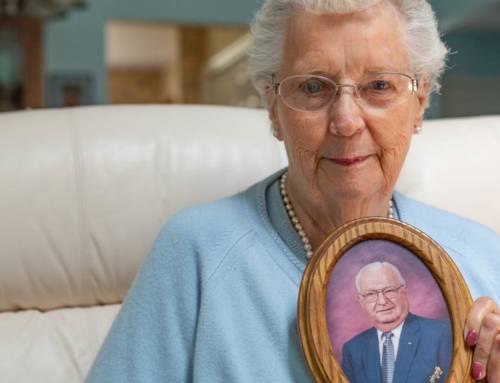
About the Author: Sunday Sermons from Sell Chapel are written by Rev. Preston Van Deursen, Director of Pastoral Care at the Masonic Village at Elizabethtown.
Someone has made a list of “Politically Correct Ways of Indicating not being too bright” Perhaps you have heard some of these. They’re quite creative. They also remind me a lot of me but I thought they were kind of fun. If we are speaking of someone who has done something really dumb, we might say:
- He’s a few clowns short of a circus . . .
- A few fries short of a Happy Meal . . .
- A few peas short of a casserole . . .
- He doesn’t have all his corn flakes in one box . . .
- The wheel’s spinning, but the hamster’s dead . . .
- His antenna doesn’t pick up all the channels . . .
- His belt doesn’t go through all the loops . . .
- The elevator doesn’t go all the way to the top floor . . .
- He is several cards short of a full deck . . .
- If he had another brain, it would be lonely . . .
- Missing a few buttons on his remote control . . .
- The lights are on, but nobody’s home . . .
I am sure you might know a few more but some of you I know will go try a few of these.
Have you ever noticed that sometimes people do really dumb things? Why do they do things like that? Jesus told a parable in which a farmer sowed good seed in his field. But while he was sleeping, an enemy came and sowed weeds among the wheat. When the wheat sprouted, the weeds also appeared. His servants came to him and said, “Sir, didn’t you sow good seed in your field? Where did the weeds come from?”
“An enemy,” replied the farmer. The servants asked, “Do you want us to go and pull them up?”
“No,” he answered, “because when you pull the weeds, you may root up the wheat as well. Let both grow together until the harvest. At that time we will collect the weeds and tie them in bundles to be burned; then we will gather the wheat and bring it into my barn.”
The implication of the parable is clear: There are good and bad folks in the world. The good folks come from God; the bad folks come from the devil. One day there will be a judgement when the good folks will be separated from the bad.
The act of sowing weeds in another man’s field as a form of revenge was so common in Jesus’ day that there were laws prohibiting it. Wheat and tares look identical until they ripen, at which point the wheat head looks very different from that of the weed.
Too bad, though, if you turn out to be a weed, rather than wheat. That is the plain, straightforward message of this parable. But there is an issue that this parable does not address.
GOOD FOLKS SOMETIMES DO STUPID THINGS. Our experience tells us that life is not as simple as the parable indicates. There are not people in white hats who always do good things and folks in black hats who always do bad things. The folks in white hats sometimes make dreadfully bad choices.
Fans of country music revere the name of George Jones. Jones has had enough hit songs on his hundred or so albums to make the careers of ten singers. Sometime back George was nearly killed in an automobile accident. He was talking on his cell phone. When the news first came out, many of his fans probably assumed that George was off the wagon again.
Along with George Jones’ talent and genius comes a dark side. Jones has a reputation for wild living and self-destructive behavior. In the past he struggled with a serious addiction to alcohol and drugs. His addictions were so severe that Jones would literally do anything to fuel his habit. At one time, George was almost outwitted by his then-wife, Tammy Wynette. To keep him away from the local bar, Tammy took George’s car keys. But George’s determination to feed his addiction won out. He hopped on his riding lawn mower and rode ten miles to the nearest bar.
Why otherwise good people allow themselves to get trapped in self-destructive patterns of behavior is beyond our understanding. And where does such behavior come from? Can we get off the hook by saying, “The devil made me do it?” Is it genetic?
There was a movie years ago called, “The Bad Seed.” Is that the answer? Are there people who are just born bad?
Early childhood experts tell us that, to a certain extent, we can tell when a child is in kindergarten whether that child is headed toward a troubled adolescence or adulthood. Is it because of a lack of nurturing, or poor potty-training or too much television?
An instructor in a dog training workshop in Salt Lake City noted that a dog’s disposition can be tested by the owner. If the owner will fall down and pretend to be hurt, a dog with a bad temper will tend to bite him. But a good dog will show concern and may lick the fallen owner’s face.
Susan Matice attended the class and then decided to test her two dogs. While eating pizza in her living room, she stood up, clutched her heart, screamed and fell to the floor. Her two dogs looked at her, looked at each other, then raced to the coffee table for her pizza.
What is it that causes some people to act irresponsibly? Just a few short years ago we had a President of the United States who was guilty of irresponsible behavior. He was not the first President to behave badly, just the most recent. But somewhere along the way the American people made a decision that President Bill Clinton was not an evil man. Most people believed him to have a good heart, but even his most rabid fans have to agree he has a serious problem that he does not seem able to control.
What causes some good people to lose control of their lives? Even more important, how can we help these people and even help ourselves when we are drawn toward similar self-destructive patterns?
Journalist Bob Garfield specializes in reporting on the quirky and unique aspects of human nature. When Garfield traveled through Santa Fe, New Mexico, in 1992, he thought that he’d hit the mother lode of quirkiness. He met people from all walks of life who were trying to find healing or wholeness through such things as aura-balancing, drum-beating ceremonies, ancient mystical therapies, crystals, astrology, spiritual channeling, and the like. Even in a Santa Fe health food store, Garfield found some highly unusual approaches to medicine. Rather than containing the average mix of vitamins and herbs, this store offered vitamin and herb mixes called, “Luminous Spirit, Positive Attitude, Women’s Courage, Emotional Rescue, Clearing Hate, Clearing Greed, Humiliation, (and) Children of Divorce. . . .”
If only we could find emotional rescue or spiritual growth in a pill! But it’s not that easy. Where do we turn for help?
FIRST OF ALL, WE NEED TO RECOGNIZE THAT LIFE IS MADE OF CHOICES. People are not born bad or good. Some people ARE born in very bad circumstances and they become scarred for life. This is why we dare not pass judgment on another human being. We don’t know how our lives would have turned out if we had experienced what they experienced. Still, none of us ever lose the ability to choose. It’s easy for us to forget, when faced with a tense situation, that we can choose how we will respond.
One stressful day, Eric Fellman and his sons set out late in the afternoon to do a little fishing. As he backed the boat into the water, Fellman realized that he had forgotten to unhook part of the trailer from the boat. The boat tipped over and began to fill with water. As Fellman jumped out of the car to survey the situation, he accidentally hit the electric lock, locking his keys inside the still-running car.
Everything was a mess! Most of the live bait had escaped into the lake, the boat was almost full of water, and their lunches were effectively drowned. Eric’s natural instinct was to get very angry and throw a fit. That’s certainly what his sons were expecting. But suddenly, he wondered what Jesus would do in his place.
He realized that Jesus must have faced a similar situation when he ran into the fishermen who had just come in from a disappointing night of fishing. Although they had given up for the day, Jesus convinced them to go out again. And, of course, they caught a whole boatload of fish. With this thought inspiring his mind, Fellman figured out how to pop open a window and unlock his car. Then he proceeded to unhitch the boat.
Although they only had three minnows left for baiting their hooks, Eric and his sons set out to fish. Within minutes, Eric got a tug on his line. Twenty minutes later, after a fierce tug of war, he reeled in a gargantuan largemouth bass. His sons were ecstatic. And all the excitement and good memories never would have happened if Eric Fellman hadn’t consciously decided to change his attitude and start all over.
We are not mere puppets forever jerked around by our emotions. We can take control. That’s the first thing we need to see. Here’s the second: HOW WE FEEL ABOUT OURSELVES OFTEN DETERMINES THE CHOICES WE MAKE.
This is no mere twentieth-century psychobabble. If we feel that our life does not ultimately matter–if we have allowed hope to slip out of our lives–if we believe we are incapable of improving our situation–then we will make our decisions accordingly. However, if we believe our lives ultimately do matter, and if we do have hope that we can improve our situations, then that also will be reflected in the decisions we make.
Former President Jimmy Carter often reflects on the changes he sees in people’s lives because of the work of Habitat for Humanity. “We see extraordinary commitments and lives changed among forgotten people,” he says. “A Habitat family that lived near Washington had been living in an abandoned automobile. One of their children was an eight-year-old boy. He was very excited about getting a new house. When the family was chosen, he jumped up and down and said, ‘We won, we won.’ After the home was finished and the family had moved in, the little boy attended a different school. He had always been in a slow learners class, but when he moved his records had been lost and he was put into a regular class by mistake. No one noticed the error, and at the end of the first half of the year, his lowest grade was a B. Now he is still learning with the smartest of students. This is what having a decent home for the first time in life can do.”
Now, you tell me. Was it the change of houses that made a difference or did the boy change his view of himself? How we view ourselves is often reflected in the choices we make. If we have a positive view of ourselves, we will make positive choices. If we have a negative view of ourselves, then watch out!
And here is the last thing we need to see: THERE IS ONE WHO SAYS TO US, “YOU ARE MINE. THERE IS HOPE FOR YOU. BY MY GRACE , YOU CAN DO IT.”
In a PEANUTS strip Lucy is parked in her psychiatric booth, and Charlie Brown is sharing his problems with her. “Sometimes I ask myself questions,” he begins. “Sometimes I ask myself, ‘Is this your real life, or is this just a pilot film? Is my life a thirty-nine-week series or is it a special?'”
In no time at all Lucy analyzes his problem and gives an instant answer: “Whatever it is,” she says, “your ratings are down. Five cents, please!”
Friends, “Without Lucy’s special permission, I want to answer our every Charlie Brown moment in this world. Yes, this is our real life. No, it is not a pilot film. Yes, it is a special–it is very special!” Why? Because Christ died in our behalf.
Why do good people do dumb things? Nobody knows all the answers. But we do know this: We always have a choice. The choices we make reflect how we feel about ourselves. There is One who tells us that our lives are special, that the choices we make do matter, and most importantly of all even when we make a bad one…even when we mess up there is always hope.
For he died on our behalf.




